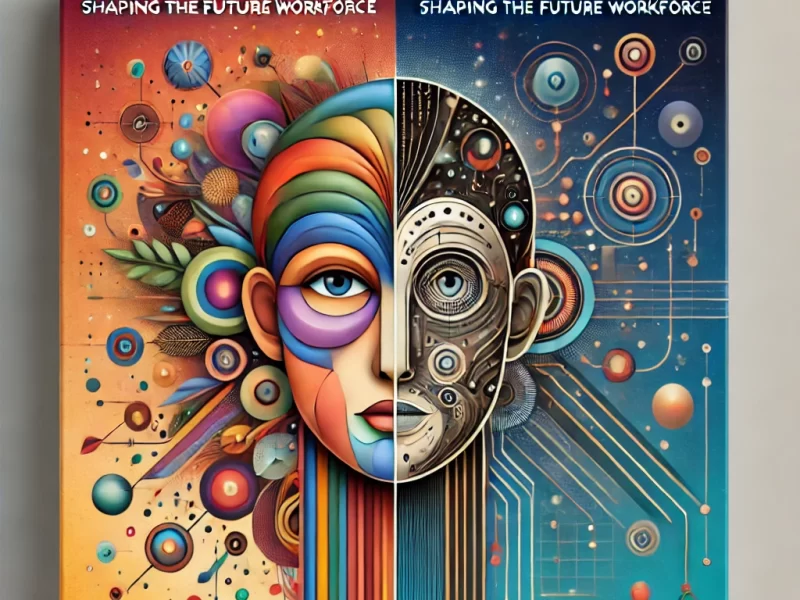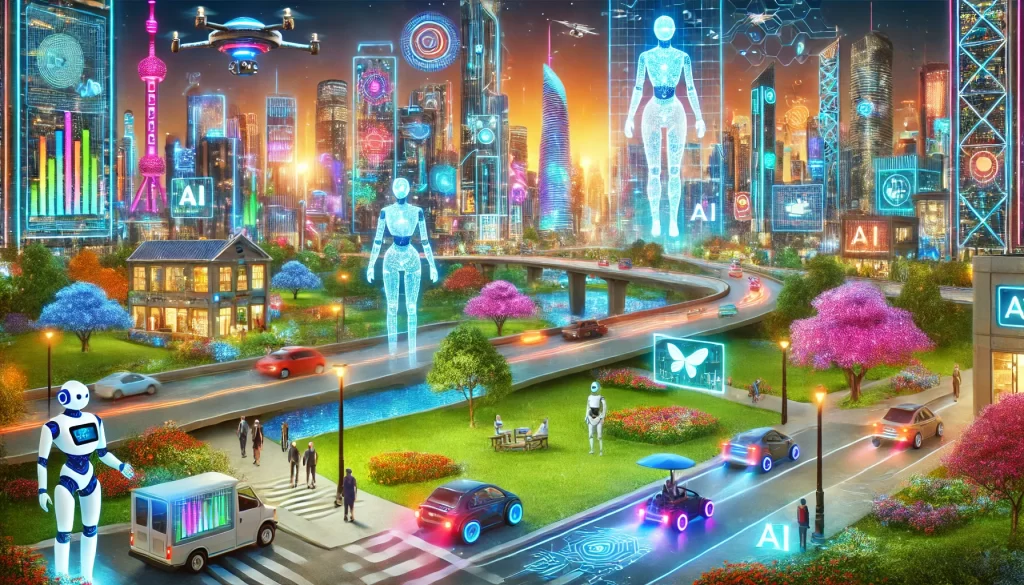

Table of Contents
What will happen?
AI will dominate the world in no time. Although AI has been forecasted to replace 85% of all jobs, it is also predicted that 97% of new different jobs will be created in the existence of AI.
The ranks of AI-linked roles such as data scientists, big data specialists, and business intelligence analysts are expected to swell by 30 to 35%, with growth nearer 45% in companies operating in China. In fact, the World Economic Forum stated that 75% of companies are set to have adopted AI technologies by 2027.
World Economic Forum also explained that employment gains in AI on workforce are expected to be strongest in the automotive and aerospace industry, where 73% of companies expect employment gains, while the research, design, and business management services, information and technology services, and electronics sectors follow closely behind.

McKinsey global institute also states that at the global average level of adoption and absorption and advances in ai implied by their simulation, AI has the profound impact to deliver additional global economic activity of around $13 trillion in the foreseeable future and by 2030, or about 16% higher cumulative GDP compared with today. This amounts to 1.2% additional GDP growth per year.
What is a Generalist?
A generalist is choosing breadth over depth, they are professional who possesses a broad range of skills and knowledge across various fields. They are adaptable and can work in multiple roles, making them valuable in dynamic environments.
Generalists often excel in problem-solving and can connect ideas from different disciplines, which is crucial in today’s interdisciplinary workplaces.
Generalists acquire a foundational understanding across various skills, which can often be achieved through shorter training programs, interdisciplinary degrees, or practical experience.
What is a Specialist?
On the other hand, a specialist focuses on a specific area of expertise. They possess deep knowledge and skills in a particular field, allowing them to tackle complex problems with precision.
Specialists are often sought after for their niche capabilities and are essential in industries that require high levels of technical knowledge. The amount of years specialists spend in the field is relatively higher than generalists as specialists their expertise is highly focused and deeply technical.
Advantages and Disadvantages : Generalists or Specialists
Advantages of Generalists
- Adaptability: Generalists can easily shift between roles and industries, making them resilient in the face of change.
- Broader Perspective: Their wide-ranging knowledge allows them to approach problems from various angles, fostering creativity and innovation.
- Collaboration Skills: Generalists often excel in teamwork, as they can communicate effectively with specialists across different fields.

Disadvantages of Generalists
- Lack of Depth: While they have a broad skill set, generalists may lack the in-depth knowledge required for highly technical roles.
- Perceived as Jack of All Trades: In some industries, generalists may be viewed as less competent due to their lack of specialization.
- Generally Paid Lower : As to be called less competent, generalists are averagely paid less than people with deeper roles
Advantages of Specialists
- Deep Expertise: Specialists can provide in-depth knowledge and advanced skills that are crucial for specific tasks or projects.
- High Demand and Salaries: Specialists are often in high demand and can command higher salaries in fields such as medicine, engineering, and IT.
- Career Advancement: Specialists can advance quickly within their field due to their expertise and the value they bring to the organization.
Disadvantages of Specialists
- Limited Flexibility: Specialists may find it challenging to transition to other roles or industries, especially if their skills are not easily transferable.
- Risk of Obsolescence: As industries evolve, specialists may need to continually update their skills to remain relevant, which can be a complicated task.
- Demands after demands to Upgrade: Barari in emeritus stated that specialists risk falling behind if they don’t update their skill sets frequently in the midst of rapid technological advancements.

When to Choose Generalists or Specialists – Questions
1. What do you want to do?
Generalists = Perhaps you find yourself answering the same question differently every time. If you find yourself passionate about various subjects, pursuing a generalist path may be fulfilling.
Specialists = Maybe you always answer the same question when people ask what you want to be, if you have a strong interest in a particular subject and enjoy diving deep into it, specializing may be the right choice.
2. Do you easily get bored with one thing?
Generalists = If you value adaptability and want to keep your options open in an ever-changing job landscape, being a generalist can be advantageous.
Specialists = If you aim to work in a field that requires specialized knowledge, such as healthcare or technology, pursuing a specialist path can lead to lucrative opportunities.
3. Do you want to delve into the business world?
If yes, then you could consider being a generalist. For freelancers and entrepreneurs, generalist skills can help in managing various aspects of a business, from marketing to finance.
4. Do you seek recognition for your expertise?
if yes, then you could consider being a specialist. Becoming a specialist can help you establish yourself as an authority in your field with high skills and knowledge.
Generalists or Specialists: Which One Will Lead the Workforce?
As the future workplace evolves, the debate between generalists or specialists in skills becomes relevant. In a changing job market, understanding the strengths and weaknesses of both career paths can help students, early-career professionals, HR managers, educators, and even policymakers make decisions about their futures.
Specialist wins the knowledge comparison
The future will present us with different visuals of workforces, which will lead us to assume that generalists may be the workforce’s leaders as they value much basic knowledge.
Nevertheless, we should also consider that AI is a robot that works for constant processes and results. As paying for numerous robots will be increasingly cheaper (especially as robots become more common) than paying for actual workers, people with general occupations will be replaced by robots.
Therefore, people assume that specialists are the remaining who won’t get replaced as they value deep knowledge in a field they pursue.
AI robot implementation needs time
Nonetheless, employers are still hiring employees that 50-59% are generalists throughout these years. Besides that, oc.tanner stated that generalists fill the skills gaps not covered by specialists, this implies that generalists are highly useful.
Although AI may take over (nearly all) generalists’ occupations, we should realize that it may take 10+ years for the “whole-replacing” phenomenon to fully happen.
Additionally, leveraging AI may only applied in developed countries, such as Japan which has used robots in Henn Na Hotel since 2015, as to the fact that the price might still be at its peak for the first couple of years.
Advancing many different robots with their own “generalist” functions also needs time. Therefore, we could assume that this robot AI may need more years to replace us in the workforce, and people will still be in demand for all functional areas.
Generalists value a bigger perspective that robot doesn’t
As generalists equipped with much knowledge across fields, generalists always lead in times of change. As oc.tanner stated, generalists are able to vision the bigger picture and connect many ideas to find solutions.
With generalists who have various experiences in facing problems in unique ways and see solutions that no one else can see. This means that people with basic skills across many fields will still be able to shine on many organizations as the value of creativity won’t be valued by AI. AI will be the hands while humans will be the brain.
The World Changes Fastly
This phenomenon would be the place where the Generalists thrive. In his book Range: How Generalists Triumph in a Specialized World, David Epstein highlights that generalists excel in what he refers to as “wicked” environments. These are situations where the rules are unclear or incomplete, patterns might be inconsistent or hidden, and feedback can be delayed or unreliable.
Epstein explains that generalists thrive in such conditions by drawing from their varied experiences to tackle challenges in innovative ways, uncovering solutions that others might overlook.
In contrast, he describes “kind” environments as settings where feedback is immediate, and clear, and repetitive patterns pave the way to success. These are the areas where specialists shine, as they can repeatedly apply their deep knowledge and skills to problems they’ve encountered in similar forms before.
Conclusion
Talking about generalists or specialists, the future workforce will face a continued debate about the roles of generalists and specialists, especially with the rise of AI. Generalists stand out for their adaptability and ability to connect ideas across disciplines, making them essential in navigating changes and solving unique problems. Meanwhile, specialists shine through their deep expertise, allowing them to excel in technical and niche fields that require precision and focus.
Although AI is predicted to replace many generalist roles, it is also expected to create new opportunities that demand human creativity and strategic thinking. The shift to AI dominance will take time, particularly in countries or industries where adoption is slower due to costs or complexity. Furthermore, generalists’ ability to see the bigger picture and innovate in ways AI cannot ensures they will still have value in the job market.
In the debate of generalists or specialists in skills for the future workplace, there is no one-size-fits-all answer. Both paths offer unique advantages and challenges. Ultimately, the choice should align with your interests, career aspirations, and the evolving demands of the job market. As the workplace continues to change, being adaptable and open to learning will be key, whether you choose to be a generalist or a specialist.